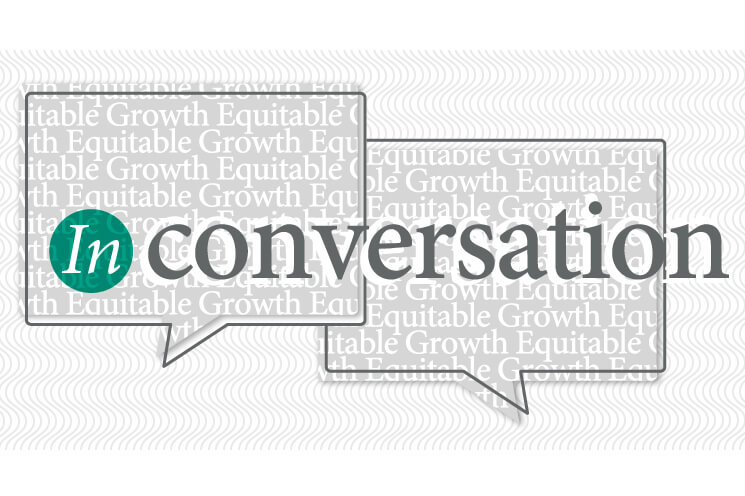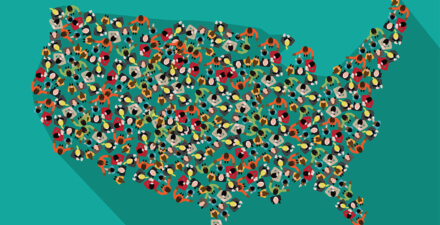Brad DeLong: Worthy reads on equitable growth, October 13-18, 2021
Worthy reads from Equitable Growth:
1. Our Expert Focus series this month tells you why you should be paying attention to the extremely sharp Francisca Antman, Mónica García-Pérez, Mark Hugo López, G. Cristina Mora, and Eileen V. Segarra Alméstica. Read Aixa Alemán-Díaz, Christian Edlagan, and Maria Monroe, “Expert Focus: Latino leaders in economics and a call for more data & research about Latinos and Hispanics,” in which they right: “Equitable Growth is committed to building a community of scholars working to understand how inequality affects broadly shared growth and stability. To that end, we have created the monthly series, ‘Expert Focus.’ This series highlights scholars in the Equitable Growth network and beyond who are at the frontier of social science research. … In honor of Hispanic Heritage Month, this installment of Expert Focus highlights Latino leaders in economics, the need for more, and more accurate, data about Hispanics and Latinos, and research that applies the intersectionality of race, ethnicity, and gender from among Equitable Growth’s academic community and beyond.. … Francisca Antman… Mónica García-Pérez … Mark Hugo López … G. Cristina Mora … [and] Eileen V. Segarra Alméstica.”
2. I remember, long ago, the wise Federal Reserve staffer David Wilcox telling me that he had realized that nowcasting was both the most difficult and most important part of his job. This looks to be an excellent forthcoming event on the current state-of-the-art here. Read about the forthcoming event, “Equitable Growth Presents: Opportunities and challenges of real-time economic measurement,” in which the participants will discuss: “The coronavirus recession led to a crop of economics working papers trying to understand the effects of the pandemic in real time. This research responded to a pressing policy need: Policymakers were prepared to spend hundreds of billions of dollars to staunch the losses of the pandemic, with relatively little knowledge of how to effectively target the money. Work by economists looked at poverty during the pandemic, how people were using stimulus checks, the impacts of enhanced Unemployment Insurance, and much more. The incredibly short turnaround time of much of this research was unprecedented for the profession. The severity of the COVID-19 crisis, the availability of administrative data sources, and new statistical tools combined to produce an enormous amount of nearly real-time data on the economic health of U.S. families. This event convenes experts on the analysis and application of real-time data to discuss what we learned over the past 18 months. Though future crises may not cause the precipitous economic gyrations that the coronavirus did, the lessons economists are learning now may help us respond more effectively to future recessions, guiding policymakers’ response to the next recession by using empirical results from the current one. Speakers [include] Austin Clemens, Director of Economic Measurement Policy, Washington Center for Equitable Growth. Erica Groshen, Senior Economics Advisor, Cornell University. Jeehoon Han, Assistant Professor, Zhejiang University. Dana Peterson, Chief Economist, The Conference Board.”
Worthy reads not from Equitable Growth:
1. The Economist has an excellent interview with two of our three Nobel Prize winners this year—David Card and Josh Angrist. If you want to know why we economists respect them so much and are cheering their Nobel Prizes so loudly, read, “A real-world Revolution in Economics,” in which the magazine says: “THIS YEAR’s Nobel prize celebrates the ‘credibility revolution’ that has transformed economics since the 1990s. Today most notable new work is not theoretical but based on analysis of real-world data [and] … How their work has brought economics closer to real life.”
2. This is better than 99 percent of the things that crossed my screen on inflation these days. Remember: you cannot rejoin the highway at speed without leaving rubber on the road, and so you should not be alarmed when you do so—unless, of course, you really do not want to rejoin the highway at speed at all. Read Claudia Sahm, “Inflation is not the emergency,” in which she writes: “Fast forward to today, and surging prices are behind us. That’s a step back to normal. Monthly inflation—a better indicator of current conditions than year of year—peaked in June 2021. In September, inflation excluding food and energy, was back near its pre-Covid average. Total inflation is higher, but food and energy prices tend to be more volatile and, as result, often tell us less about where inflation is headed. Supply chains and commodity prices remain a thorn in the side of consumers and businesses. As with jobs, progress is progress, even when it’s slower than we want. Demand matters for inflation too. This year spring demand surged. In fact, in April and May of 2021, the highest percent of consumers, on net, said it as a good time to buy big-ticket durables since the crisis began. That coincided with the surge in inflation. Now that measure of demand is lower than the depths of the recession. Again, it’s hard to see a spiral inflation taking hold when consumers are willing to wait it out until inflation settles down, as they expect it will. … Inflation is not an emergency, but getting the pandemic under control is.”
3. This is, I think, the best single thing to read about the Economics Nobel Prize for Card, Angrist, and Imbens. Read Noah Smith, “The Econ Nobel we were all waiting for,” in which he writes: “To predict who will win the Econ Nobel … list the most influential people in the field who haven’t won it yet [and] … Assume … micro theorists won’t win … two years in a row. … The ones whose influence is the oldest are the most likely to win. … For years, this method led lots of people—including me—to predict a Nobel for David Card. His 1994 paper with Alan Krueger on the minimum wage was a thunderbolt. … Since then, Card has been at the forefront of empirical labor. … Angrist and Imbens’ impact … though also huge … came later. … I wouldn’t have been surprised had they won the prize in later years. But Card was clearly overdue. Perhaps the reason it took this long was that Card’s conclusions in his famous minimum wage paper were so hard for many in the field to swallow. … At the time, Card and Krueger’s finding seemed revolutionary and heretical. In fact, other researchers had probably been finding the same thing, but were afraid to publish their results, simply because of their terror of offending the orthodoxy.”




